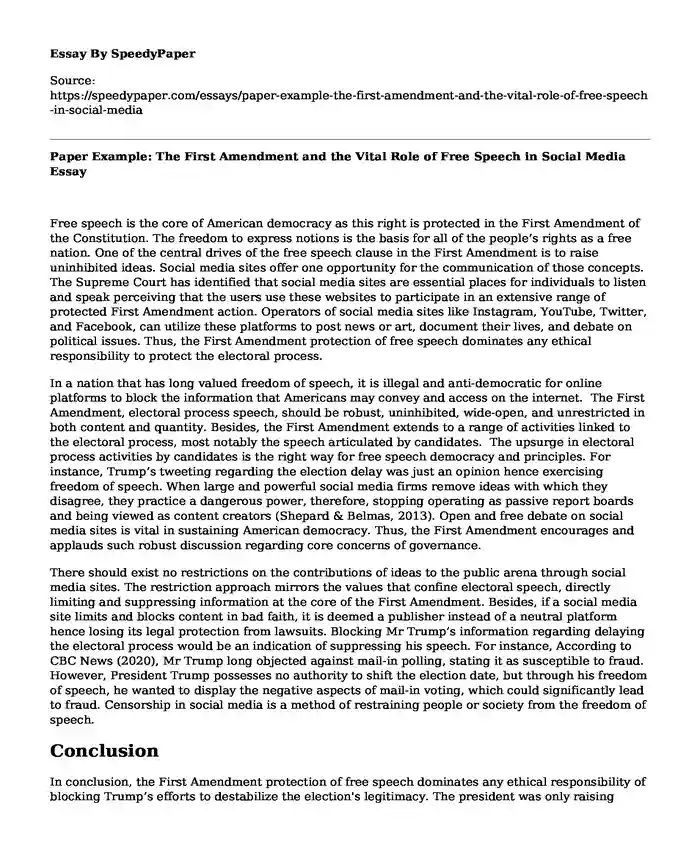
| Type of paper: | Essay |
| Categories: | Ethics Social media |
| Pages: | 3 |
| Wordcount: | 655 words |
Free speech is the core of American democracy as this right is protected in the First Amendment of the Constitution. The freedom to express notions is the basis for all of the people’s rights as a free nation. One of the central drives of the free speech clause in the First Amendment is to raise uninhibited ideas. Social media sites offer one opportunity for the communication of those concepts. The Supreme Court has identified that social media sites are essential places for individuals to listen and speak perceiving that the users use these websites to participate in an extensive range of protected First Amendment action. Operators of social media sites like Instagram, YouTube, Twitter, and Facebook, can utilize these platforms to post news or art, document their lives, and debate on political issues. Thus, the First Amendment protection of free speech dominates any ethical responsibility to protect the electoral process.
In a nation that has long valued freedom of speech, it is illegal and anti-democratic for online platforms to block the information that Americans may convey and access on the internet. The First Amendment, electoral process speech, should be robust, uninhibited, wide-open, and unrestricted in both content and quantity. Besides, the First Amendment extends to a range of activities linked to the electoral process, most notably the speech articulated by candidates. The upsurge in electoral process activities by candidates is the right way for free speech democracy and principles. For instance, Trump’s tweeting regarding the election delay was just an opinion hence exercising freedom of speech. When large and powerful social media firms remove ideas with which they disagree, they practice a dangerous power, therefore, stopping operating as passive report boards and being viewed as content creators (Shepard & Belmas, 2013). Open and free debate on social media sites is vital in sustaining American democracy. Thus, the First Amendment encourages and applauds such robust discussion regarding core concerns of governance.
There should exist no restrictions on the contributions of ideas to the public arena through social media sites. The restriction approach mirrors the values that confine electoral speech, directly limiting and suppressing information at the core of the First Amendment. Besides, if a social media site limits and blocks content in bad faith, it is deemed a publisher instead of a neutral platform hence losing its legal protection from lawsuits. Blocking Mr Trump’s information regarding delaying the electoral process would be an indication of suppressing his speech. For instance, According to CBC News (2020), Mr Trump long objected against mail-in polling, stating it as susceptible to fraud. However, President Trump possesses no authority to shift the election date, but through his freedom of speech, he wanted to display the negative aspects of mail-in voting, which could significantly lead to fraud. Censorship in social media is a method of restraining people or society from the freedom of speech.
Conclusion
In conclusion, the First Amendment protection of free speech dominates any ethical responsibility of blocking Trump’s efforts to destabilize the election's legitimacy. The president was only raising queries regarding the chaos democrats have generated with their persistence on all mail-in voting. The notion that voting from home during the coronavirus pandemic would result in an eruption of fraud is a developing theme for Trump. The First Amendment allows people to express themselves through dissemination and publication. It is a section of the constitutional safeguard of freedom of expression. Therefore, the right to freedom of speech enables persons to express themselves without interference or regulation from the government.
References
CBC News (2020, July 30). Trump suggests delaying U.S. election [Video].YouTube. https://www.youtube.com/watch?v=axwJncFouXk
Shepard, J. M., & Belmas, G. (2013). Anonymity, Disclosure and First Amendment Balancing in the Internet Era: Developments in Libel, Copyright, and Election Speech [PDF File]. Yale Journal of Law and Technology. https://digitalcommons.law.yale.edu/yjolt/vol15/iss1/2
Cite this page
Paper Example: The First Amendment and the Vital Role of Free Speech in Social Media. (2023, Nov 05). Retrieved from https://speedypaper.net/essays/paper-example-the-first-amendment-and-the-vital-role-of-free-speech-in-social-media
Request Removal
If you are the original author of this essay and no longer wish to have it published on the SpeedyPaper website, please click below to request its removal:
- Free Essay with Pete's Dragon Movie Review
- Essay Example on Capitalism and Consumerism in the Film Fight Club
- Essay Example about Media Mandates and Media Regulations
- "Reflection on the End of Racial Representation" Chapter Discussion Essay Sample
- Free Essay Example on Media Reporting and Racism
- Data Privacy in Information Technology - Free Paper Example
- Free Essay Example on Ethics in Teaching
Popular categories




